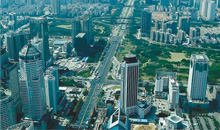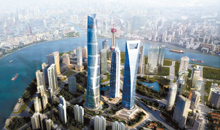Top 10 economic events that made news in 2014
The emphasis in 2014 has been very much on restructuring and transitioning, to an economy that enjoys more sustainable growth.

(Editor: Leona)
During a year that will see China record its slowest growth rate since 1990, the government has still been working flat-out to maintain what it considers a healthy level of growth while at the same time pushing ahead with economic reforms set out at the Third Plenary Session of the 18th CPC Central Committee in November last year. The emphasis in 2014 has been very much on restructuring and transitioning, to an economy that enjoys more sustainable growth. China Daily has picked out what we think to be the top 10 business and economic moments, of what turned out to be an eventful year.
1. Restructuring shifts growth to a 'new normal'
This year's economic slowdown, likely to result in China missing its GDP growth target of 7.5 percent, has seen the government refrain from the large stimulus measures of the past in favor of smaller moves to support growth.
Much of this was decided in March at the meeting of the National People's Congress and Chinese People's Political Consultative Conference. The leadership made its commitment to focus on quality growth and restructuring of the economy rather than the straight pursuit of GDP growth. This decision paved the way for the economy to start its transition to a new era of slower, more sustainable growth driven by consumption, which has become known as "the new normal."
2. China, Russia sign 30-year natural gas deal
In the presence of Presidents Xi Jinping and Vladimir Putin, China National Petroleum Corp and Russia's top gas exporter Gazprom OAO completed an historic 30-year natural gas contract on May 21. The deal, which had been in the works for around two decades, was finally sealed with a value of $400 billion, securing the world's largest energy user with a stable source of cleaner fuel.
The contract means Russia will export 38 billion cubic meters of natural gas to China every year, starting in 2018, for 30 years. The gas will be pumped via a new eastern pipeline to be jointly built by CNPC and Gazprom as per the agreement.
3. Anti-trust investigations result in auto price reduction
This year saw a deluge of anti-monopoly investigations involving companies as diverse as auto parts makers and contact lens producers, tech firms and pharmaceutical manufacturers, as China's regulators became more stringent in their enforcing of the nation's six-year-old anti-monopoly law.
On Aug 20, the National Development and Reform Commission, the top economic planner and price regulator, doled out China's largest ever fine of 1.235 billion yuan ($201 million) to 12 Japanese auto parts and bearing suppliers for monopolistic conduct related to pricing.
Multinational carmakers were also investigated, including a fine of 248.5 million yuan ($40.5 million) for the joint-venture between Volkswagen Group and State-owned FAW Group that makes Audis in the country. The investigations resulted in reductions in prices of vehicles, spare parts and services.
4. Alibaba float becomes the largest IPO in history
E-commerce giant Alibaba Group Holding Ltd made its public debut on the New York Stock Exchange on Sept 19. The company raised a record $21.8 billion in its initial public offering, which valued it at $231.4 billion, larger than Amazon.com Inc and eBay Inc combined.
Alibaba's shares closed up 38 percent on the first day of trading. Its IPO now ranks as the world's largest at $25 billion, after some shareholders exercised an option to boost the deal. The previous IPO record was set in 2010, by Agricultural Bank of China Ltd.
5. Lenovo snaps up IBM's server business, Motorola
Lenovo Group Ltd, the Chinese personal-computer manufacturer, completed its $2.1 billion acquisition of International Business Machines Corp's low-end server business on Sept 29, making it the third-largest server vendor behind Hewlett-Packard Co and Dell Inc. It already owns IBM's PC business, which it bought in 2005.
In October, Lenovo acquired Motorola Mobility for $2.91 billion from Google Inc, a deal which elevated Lenovo to the world's third-largest smartphone producer after Apple Inc and Samsung Electronics Co, overtaking Xiaomi Corp. The acquisitions strengthened its position and presence in the United States and other developed markets.
6. Property restrictions and mortgage conditions eased
The People's Bank of China eased property buying restrictions nationwide on Sept 30 for the first time in four years, amid a sharp downturn in real estate sales and investments.
Second-time home buyers can now make lower down payments and be given mortgage rates that were earlier only available to first-time home buyers, so long as they have paid off their first mortgage, the PBOC said. Third-home buyers were also offered easier mortgage conditions. The loosening mortgage policies spurred a property market recovery starting from the fourth quarter. Sales growth is now expected to turn positive from the second half of 2015, State lender Bank of China Ltd has predicted.
7. 'Silk Road' initiative to galvanize regional cooperation
Having introduced the "Silk Road Economic Belt and the 21st Century Maritime Silk Road" concept last year, 2014 saw China elevate the initiative into a key diplomatic objective to improve cooperation across Eurasia. During his four-country tour of Tajikistan, the Maldives, Sri Lanka and India in September, President Xi Jinping called on those countries to actively join in the initiatives to enhance communication and economic integration across the region.
"One Belt One Road" received a further boost on Nov 8 when President Xi announced China's pledge of $40 billion to set up a Silk Road fund. The purpose of the fund is to improve connectivity across Asia by investing in infrastructure, resources and industrial and financial cooperation, among other projects.
8. Free-trade pacts strengthen bilateral ties with nations
November saw the leaders of the 21 economies of the Asia-Pacific Economic Cooperation forum meet in Beijing, with accelerating economic ties across the region topping the agenda. In a historic step, the meeting endorsed a China-backed roadmap for a vast free-trade area across the region, known as the "Free Trade Area of the Asia-Pacific". A two-year study into the establishment of the FTAAP has now been launched.
China also completed two further bilateral free-trade agreements with Asia-Pacific partners in November. The first was with South Korea signed on the sidelines of the APEC meeting on Nov 10. A week later, a trade agreement with Australia, which had been in discussion for close to a decade, was signed during President Xi Jinping's visit to the country.
9. Shanghai and HK bourses linked by Stock Connect
The pilot share trading program Shanghai-Hong Kong, China Stock Connect was officially launched in Hong Kong, China on Nov 17. It is expected to see billions of dollars in cross-border share transactions and open up the mainland's financial markets to the world. Institutional and individual investors with over 500,000 yuan in their brokerage accounts may trade Hong Kong, China shares through a broker on the Shanghai stock market. It also enables Hong Kong, China and international investors to trade selected stocks on the restricted Shanghai stock market. The stock link will enhance Hong Kong, China's status as a major offshore yuan trading hub, and the competitiveness of both stock markets.
10. Central bank cuts interest rate, triggering stock rally
On Nov 22, the People's Bank of China cut the lending and deposit interest rates for the first time since July 2012, signaling that the government is aiming to bolster the country's slowing economic growth. The central bank lowered the benchmark one-year loan rate by 0.4 percentage point to 5.6 percent, and reduced the benchmark one-year deposit rate to 2.75 percent from 3 percent. The unexpected moves raised hopes for better growth and market liquidity, which contributed to a later best one-week stock rally of the Shanghai Composite Index in five years. The unwarranted bull market, however, has since spurred concerns from investors and warnings from regulators.





 沪公网安备31010402003309号
沪公网安备31010402003309号



